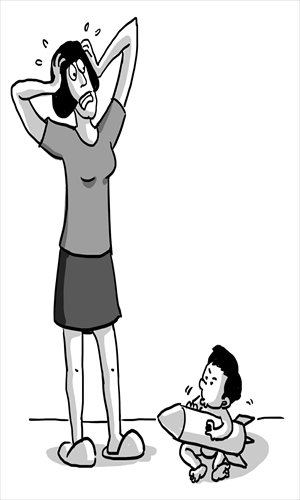North Korea’s nuclear games endanger China

The constant rhetoric of war from North Korea following the latest UN condemnations may seem ridiculous to most people. But it has its own logic, and not an insane one.
In fact, the third nuclear test, the satellite launch last December, and the recent overwrought language on the US-South Korea joint drills, all reflect North Korean leader Kim Jong-un's hopes to kill two birds with one stone.
Internationally, North Korea aims at dragging the US back to negotiation table and gaining more aid from the US by playing the nuclear card.
Despite North Korea's tests and warnings, Kim expressed his eagerness to get a phone call from US President Barack Obama during former NBA star Dennis Rodman's North Korea visit in late February.
Internally, Kim can consolidate his leadership through the series of tough actions against the US and South Korea.
The shake-up of the military last July, with the top commander Ri Yong-ho relieved of all his duties, showed the power struggle in the core leadership after Kim was sworn in as the top leader. The decades-long "military first" policy has already helped the military grow into the mightiest interest group in North Korea, and one whose support Kim desperately needs.
Kim also knows that North Korea has little chance to experience Iraq or Libya's fate because of China. The Sino-North Korean Mutual Aid and Cooperation Friendship Treaty signed in 1961 declares the two countries should "guarantee to adopt immediately all necessary measures to oppose any country or coalition of countries that might attack either nation."
Hence China will try its best to stop any military attacks against North Korea to avoid being involved in unnecessary military confrontation with its trade partners like the US and South Korea, and to avoid the huge economic and human losses that the Korean War (1950-53) caused.
North Korea still carries strategic importance to China. And the point is underestimated by those Chinese scholars who advocate abandoning North Korea.
North Korea still acts as a buffer. If North Korea collapses and Kim is replaced by a pro-US regime, it will pave the way for the US to redeploy its forces in South Korea to China's northeast border, which will be a big security danger when the US and China lack military mutual trust.
China also has to keep the Northeast stable. A flock of North Korean refugees would throw the region into disorder and disrupt an economy that is now aspiring to take its old place as China's industrial heartland back.
Therefore, a key priority for China is to ensure the Kim regime's survival and prevent North Korea from collapse. But should China continue to be a patron of North Korea, no matter what it does?
Even if North Korea's nuclear development is only targeted at the US, its nuclear programs will bring huge risks to China rather than the US.
The third nuclear test in February was conducted only just over 100 kilometers away from China's northeast border. Though Chinese authorities appeased the public by swearing the mountains along the border could effectively prevent nuclear radiation spreading to China, the possibility that nuclear leakage may pollute underground water can't be ruled out.
The underground water safety is not only closely linked with the Northeast China's drinking water, but also a hidden danger for China's food safety and even food security.
In as early as 2010, the Chinese central government issued a document pointing out that Northeast should be built up as a pillar of national food security. In 2011, the total grain output of the Northeast reached 108 million tons, accounting for one-fifth of the nation's total.
Japan's Fukushima nuclear disaster is the latest lesson. Fukushima prefecture, where agriculture is a pillar industry, is highly contaminated. Food production has been severely impaired. China can't afford to risk a replication of the Fukushima disaster in the Northeast.
What China should do now is to protect North Korea by offering nuclear umbrella just as the US does to Japan and South Korea, but also force it to accept China's advice to abandon nuclear programs. If a fourth nuclear test is conducted, China will face greater risks than any other country.
The author is an independent observer on international affairs. opinion@globaltimes.com.cn